Wheelchair-friendly weightlifting equipment guarantees everyone can enjoy strength training benefits. You’ll find adaptive weight bars with adjustable grips, wheelchair-compatible resistance bands, seated bench press stations, specialized cuffs for secure lifting, and adjustable dumbbells. These tools accommodate various mobility levels while providing proper support and resistance options. Whether you’re a beginner or experienced lifter, these accessible options help you build strength, improve posture, and enhance independence. Discover how these innovative tools can transform your fitness journey.
Adaptive Weight Bars and Grips for Enhanced Mobility
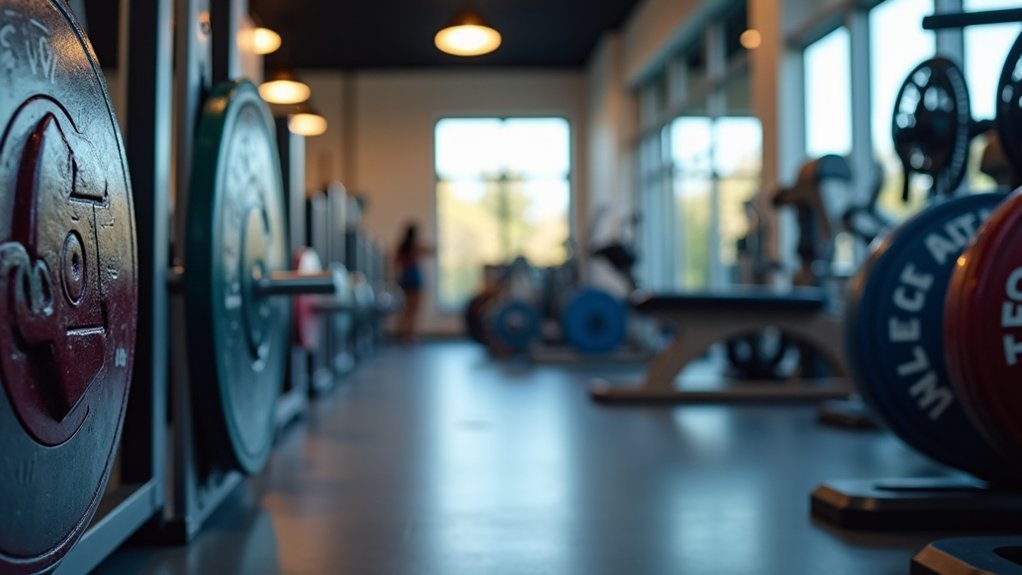
While traditional weightlifting equipment often presents barriers for wheelchair users, adaptive weight bars and grips have revolutionized strength training accessibility.
These innovative tools feature ergonomic designs with adjustable widths to accommodate different body types and grip strengths, making them ideal for wheelchair users.
Ergonomic designs that adapt to your body—not the other way around—creating truly inclusive strength training opportunities.
You’ll appreciate the customizable weight options that allow you to gradually increase resistance based on your individual strength levels and rehabilitation goals.
The textured surfaces and rubberized materials provide secure holds, minimizing slippage risks during your adaptive fitness routine.
Many bars are specifically designed for seated exercises, integrating seamlessly with your wheelchair.
When combined with other adaptive fitness equipment, these specialized weight bars create an all-encompassing strength training program that respects your mobility needs while maximizing your fitness potential.
Wheelchair-Compatible Resistance Bands and Cable Systems
Resistance bands and cable systems have emerged as game-changing tools for wheelchair users seeking effective strength training options.
These wheelchair accessible fitness solutions provide adjustable resistance without bulky weights, making them perfect for any fitness level.
When selecting adaptive exercise equipment for wheelchair training, look for:
- Bands with secure handles and ankle straps that allow you to target both upper and lower body muscle groups.
- Cable systems with adjustable height settings to accommodate your wheelchair positioning.
- Portable options you can easily transport between home, gym, or rehabilitation sessions.
You’ll appreciate how these versatile tools enhance your strength and flexibility while supporting rehabilitation goals.
Their lightweight design and versatility make resistance bands an essential component of any wheelchair fitness routine, allowing you to work out effectively wherever you are.
Seated Bench Press and Strength Training Stations
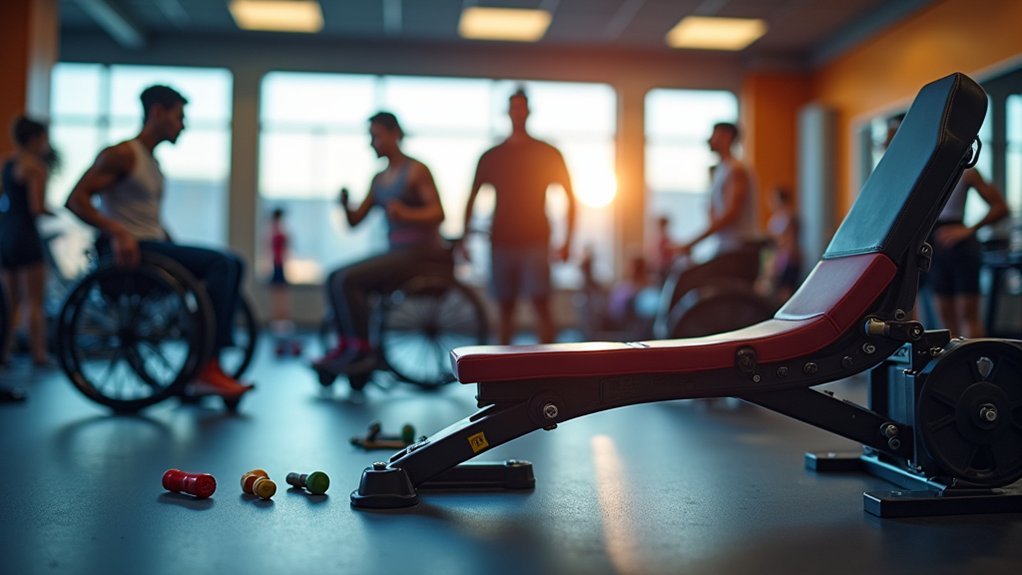
Many wheelchair users find that seated bench presses and specialized strength training stations represent the cornerstone of an effective upper body workout routine.
These adaptive training tools are specifically designed to provide stability and proper positioning for wheelchair fitness enthusiasts.
You’ll appreciate how strength training stations come equipped with adjustable seats and supportive arm rests that help maintain proper form during your workouts.
Many feature pneumatic resistance technology, making them accessible regardless of your fitness level—whether you’re just starting out or advancing in your rehabilitation journey.
The touch screen interfaces on modern seated bench presses allow you to independently customize your workout, track progress, and select exercises.
Regular use of these specialized stations will enhance your muscle strength, improve posture, and boost overall health.
Specialized Cuffs and Harnesses for Secure Lifting
For wheelchair users who want to enhance their weightlifting experience, specialized cuffs and harnesses represent vital equipment that bridges the gap between desire and ability.
These adaptive exercise equipment solutions provide significant support for individuals with missing or injured limbs, ensuring secure lifting during various strength training exercises.
When integrating specialized cuffs into your physical therapy or fitness routine, you’ll benefit from:
- Enhanced safety through stabilized weights and proper alignment during lifts
- Custom fit options that accommodate different body types and abilities
- Durable, comfortable materials that withstand intense workouts while preventing discomfort
You’ll find tools like the Deadlift Harness particularly valuable as they’re designed to distribute weight evenly while providing the stability you need to lift confidently and effectively, regardless of mobility challenges.
Adjustable Dumbbells and Free Weights for Independent Workouts
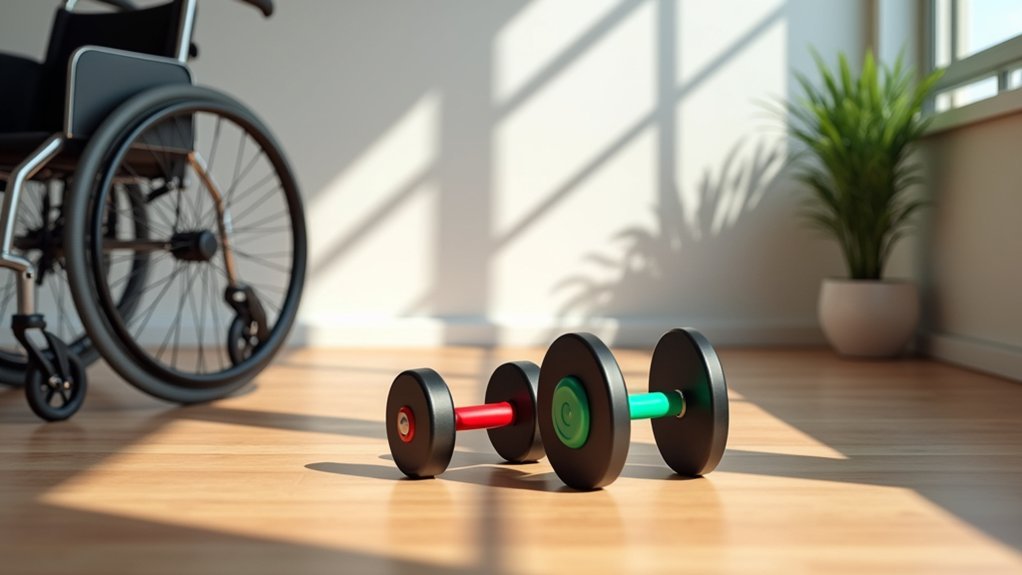
Independence flourishes when you have the right tools at your disposal, and adjustable dumbbells represent a game-changer for wheelchair users seeking to build strength on their own terms.
These versatile free weights offer precise control with increments as small as 0.5 kg, allowing you to tailor your resistance level specifically to your needs.
You’ll appreciate the ergonomic grips featured on quality adjustable dumbbells, reducing strain during adaptive exercise equipment workouts.
Position these weights for seated exercises like chest presses and tricep extensions to develop essential upper body strength without transferring from your wheelchair.
The beauty of free weights lies in their simplicity and adaptability—you can gradually increase resistance as your strength improves, maintaining control of your fitness journey while enhancing coordination and building functional independence.
Frequently Asked Questions
How Should I Transition From Rehabilitation to Adaptive Weightlifting?
Start by consulting your physical therapist for clearance. Then, gradually introduce adaptive weightlifting equipment, focusing on proper form and manageable weights. You’ll want to increase intensity slowly while listening to your body’s feedback.
Can Wheelchair Athletes Compete in Mainstream Powerlifting Competitions?
Yes, you can compete in mainstream powerlifting as a wheelchair athlete. Many federations now offer adaptive divisions with modified rules while maintaining the same core lifts and competitive spirit.
What Certifications Should Trainers Have for Coaching Wheelchair Lifters?
Look for trainers with NSCA-CSCS, NASM-CES, or ADA-specific certifications. You’ll benefit from coaches with adaptive training experience, spinal cord injury knowledge, and specialized credentials in working with wheelchair athletes.
How Do I Modify Existing Gym Equipment on a Budget?
You can modify gym equipment affordably by adding grip assists with athletic tape, using PVC pipe extensions, installing strap attachments, repurposing resistance bands, and creating raised platforms with sturdy plywood and rubber mats.
What Insurance Considerations Apply for Home Adaptive Weightlifting Setups?
Check with your homeowner’s insurance for liability coverage limitations. You’ll need to notify them about adaptive equipment, consider umbrella policies for additional protection, and document all safety modifications for potential claims.
In Summary
You don’t need to let physical limitations define your fitness journey. With these five wheelchair-friendly weightlifting tools, you’ll gain independence and confidence in your strength training. Whether you’re using adaptive grips, resistance bands, specialized stations, supportive cuffs, or adjustable weights, you’re empowered to challenge yourself and achieve your fitness goals. Embrace these accessible options and continue building strength on your terms.

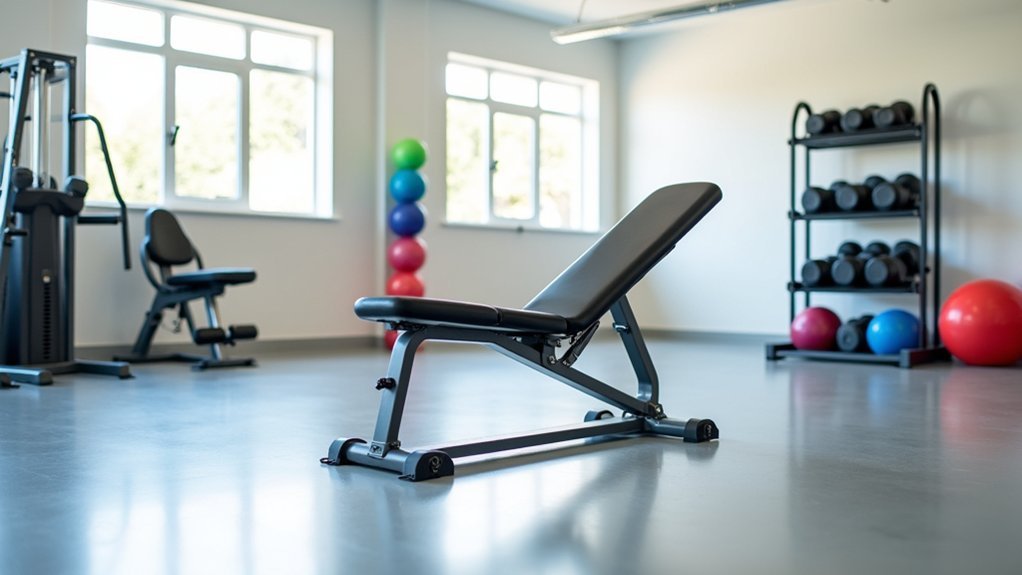
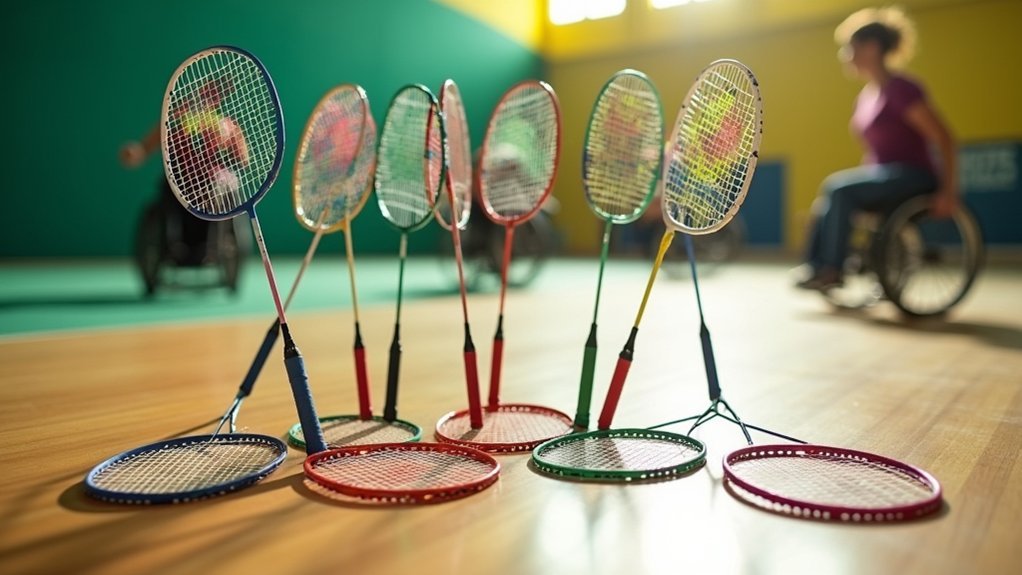
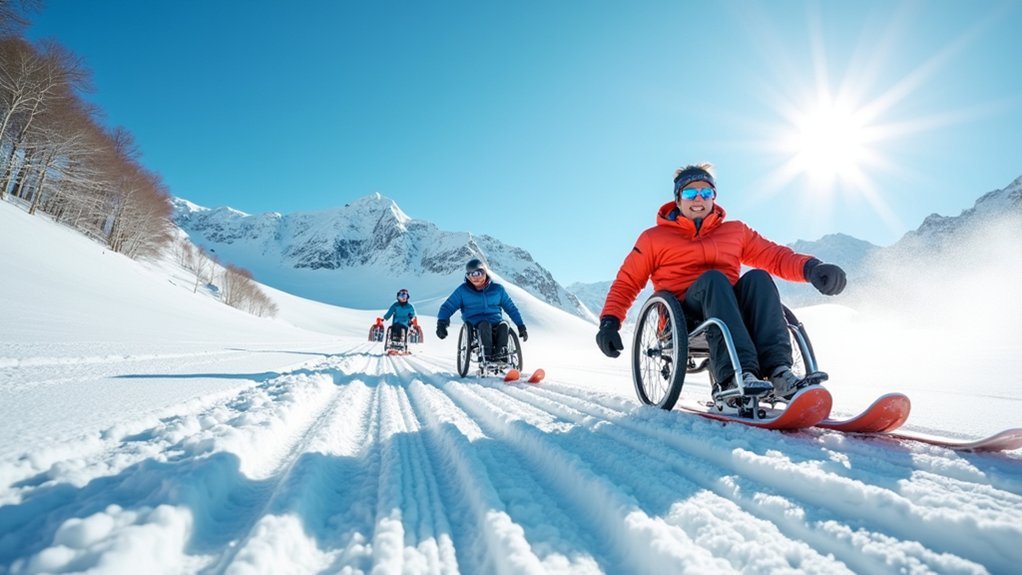
Leave a Reply